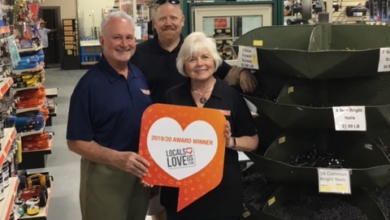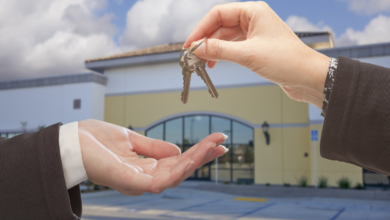How Retailers are Coping with COVID-19
 Social distancing guidelines were sometimes tricky for essential businesses to navigate.»
Social distancing guidelines were sometimes tricky for essential businesses to navigate.»
Retailers around the world, operating all kinds of stores, have never faced a situation such as the one they have been battling since early this year. Many types of retailers, deemed non-essential, have gone out of business when they had to shut down and remain so for months on end with no sales at all.
Hardware stores, home centers and lumber and building material dealers have been lucky, considered essential in most areas, but they have had to cope with operating problems completely foreign to them.
A recent research study, conducted by Zebra Technologies, reports on the various actions taken by a wide variety of retailers in contending with the problems brought about by COVID-19.
 Retailers like Aubuchon Hardware learned how to implement curbside pickup service on the fly. »
Retailers like Aubuchon Hardware learned how to implement curbside pickup service on the fly. »
The study was based on information obtained from 104 executives operating 98 businesses of various types. Twenty percent of the retailers were specialty hard goods retailers, which would include hardware stores and home centers. It was the largest group. Big-box mass merchants, soft goods retailers and department stores each represented 12 percent of the study base, while supermarkets comprised 10 percent.
So, how are American retailers coping?
As one might expect, hygiene and safety precautions seemed to be the biggest challenge. It caused retailers to invest time and, in some cases, considerable expense to sanitize shopping carts and fixtures, install transparent barriers in front of checkout stations, etc. The frequency with which such actions had to be taken varied, but were a necessity.
A number of retailers posted signs on the floor, indicating the recommended six-foot social distance space between customers. In quite a number of cases, retailers had to hire extra help to perform the sanitizing chores either during store hours or after the store closed.
Nearly half of the respondents said they also had to devote a great deal of time and money in extensive training of employees to ensure that they understood the need for extra care and the necessity of sanitation efforts. Such training also was necessary, they reported, in efforts to retain their employees, some of whom were ready to leave their jobs because of worries about being infected by COVID-19.
 Some retailers plan to continue screening employees for health symptoms even after the pandemic ends.»
Some retailers plan to continue screening employees for health symptoms even after the pandemic ends.»
BOPIS (Buy online, pickup in stores) continued to be used, but it was found that curbside pickup was the preferred choice of an increasing number of consumers. Actually, some retailers did not let customers come into their stores, relying solely on curbside pickup policies to generate sales. Forty-six percent of the retailers said they were managing expanded curbside pickup operations. In most cases, this required establishing new instructions for retailer websites, hiring more people to handle curbside deliveries and to set aside space so that customers could get their curbside pickups.
In some cases, because of their store location, curbside pickups were more difficult to arrange.
Retailers did report that some customers were wary about touching items when they were shopping, fearing that they might become infected. That’s why an aggressive sanitation/cleaning procedure had to be undertaken and made visible to reassure consumers that shopping with them was safe. In most cases, retailers used signs to explain to customers that sanitation procedures were being undertaken.
 Celina Lumber in Celina, Tenn., adopted stringent cleaning protocols.»
Celina Lumber in Celina, Tenn., adopted stringent cleaning protocols.»
Most retailers insisted that customers wear masks and were able to provide masks if customers did not have one.
Retailers also reported that online ordering increased, in some cases dramatically. From other research, we know that online sales in some product categories represent almost half of all sales. The impact of COVID-19 on retailing means that every retailer needs to improve the online ordering process on their website.
One of the more interesting findings in the survey is that some of the responding retailers said they were providing employees with mobile technology so they could check on items for consumers. Extended use of mobile devices helped increase customer satisfaction, they said. It also was a way to enable employees to suggest add-on items or to encourage step-up sales to a better quality, higher-priced item.
 Like most retailers, Island Home Center installed plexiglass shields to protect cashiers and customers.»
Like most retailers, Island Home Center installed plexiglass shields to protect cashiers and customers.»
Retailers said they also found mobile devices in the hands of employees provided another way to train employees on store procedures and to instill product knowledge, so the investments paid off. Clever retailers urged employees to use their mobile devices to show customers videos about products, especially those in the how-to category. These devices helped both employees and customers, so the expense seemed worthwhile.
Given the challenges of doing business in unconventional ways, retailers said they spent a lot more time on training, in some cases because they hired extra part-time help who needed more training. Training methods included lots of videos, in-person advice and use of mobile material, as well as conventional printed materials.
Hardware and home improvement retailers have wisely invested more time and money into e-commerce initiatives, which will continue to pay off over time. They have also beefed up their delivery programs to complement their curbside service offering and introduced mobile checkout methods, which are all new ways to establish their stores as the destination for convenience even after the pandemic ends.
“My word of the day is gratitude. We are so grateful to be an essential business during a pandemic,” says Leigh Ann Akard of Akard True Value Hardware in Zionsville, Ind. “We try so hard to meet people’s needs and sometimes there’s no way to please everyone. We’re operating as normal as possible in abnormal times.”
She said it was awesome to see her team work so well in such adverse conditions this year. “It’s like being on a treadmill and every day the speed and the incline picked up,” Akard adds.
“We absolutely believe our number one job is to share our hope and goodwill with the community and that together we will take care of one another and this will be the best year we have ever had,” says Jason Haley of Ace Hardware of Clarkston in Clarkston, Mich.

The Hardware Connection is a digital magazine targeted to independent hardware/home improvement retailers. It is the only industry magazine designed and distributed solely in electronic format and currently reaches over 60,000 people in the two-step channel.
The Hardware Connection publishes four Newsletters each year in addition to eight magazine issues.
To sign up yourself or additional staff to a free subscription to receive The Hardware Connection magazine and newsletter in electronic format, please click here.







